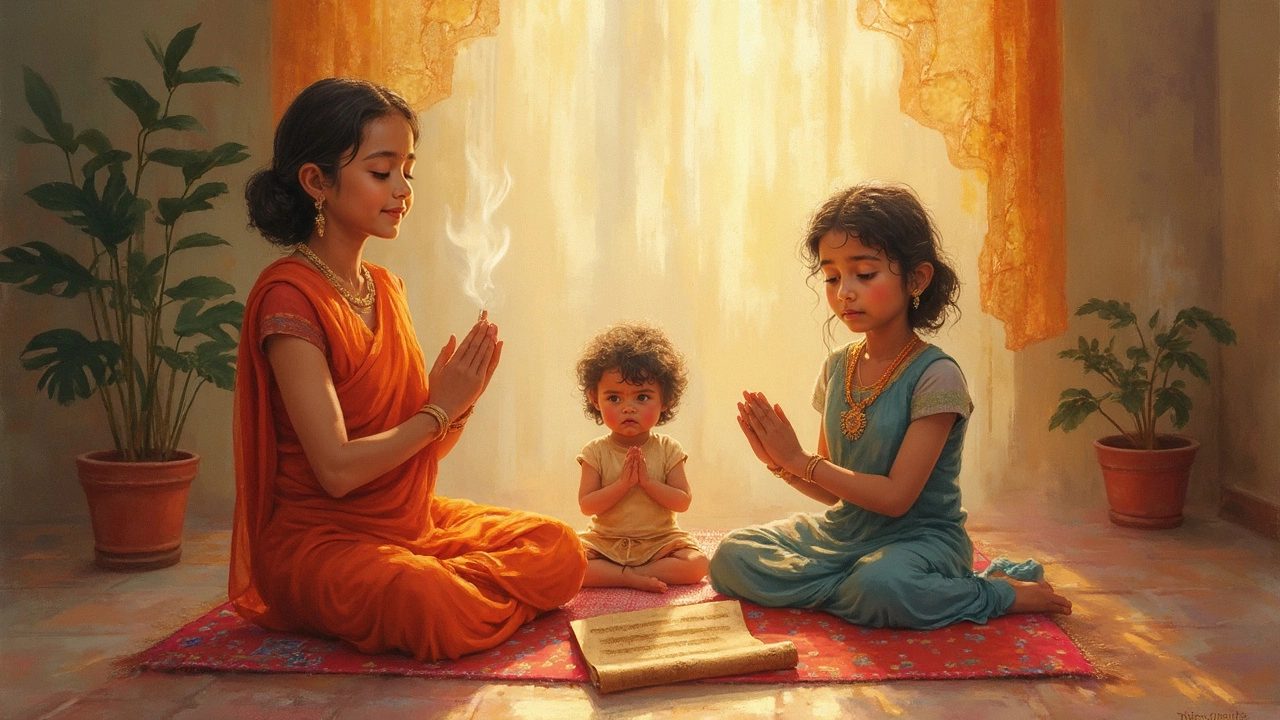Spiritual Quotes – Inspiration for Everyday Life
Looking for a quick boost of calm or a fresh perspective? Spiritual quotes from Indian traditions can give you that lift in just a few seconds. Whether you need a line from the Bhagavad Gita to guide your workday or a short chant to settle your mind, the right words can change your mood fast.
Top Quotes from the Bhagavad Gita
The Gita is full of short, powerful verses that people quote on social media, in talks, and even on office walls. One of the most popular lines is, “Yogaḥ karmasu kauśalam” – “Yoga is skill in action.” It reminds us that doing our duty with focus is a form of meditation. Another favorite is, “Śraddhā vayam aśramam adhigacchāma” – “With faith, we reach the highest goal.” This line works well when you feel stuck; a little faith can push you forward.
Our article “Famous Line of the Gita: Unraveling Its Spiritual Wisdom” breaks down why these verses still matter. It shows how the ancient text talks about modern problems like stress and decision‑making. If you’re curious about the deeper meaning behind a single line, that post gives a simple explanation without the academic jargon.
How to Use Simple Mantras Daily
Mantras are another easy way to bring spirituality into a busy routine. The Shanti mantra – “Om Shanti Shanti Shanti” – is a go‑to for peace. Our guide “Hindu Chant for Peace: Meaning, Uses, and Daily Practice” shows you when to chant, how long to repeat, and why three “Shanti” sounds matter. Try chanting for one minute before a meeting; you’ll notice a calmer mind and clearer thoughts.
Even if you’re not Hindu, the mantra’s vibe works for anyone who wants a moment of silence. Just close your eyes, breathe in, say “Shanti” three times, and breathe out. Do it a few times a day and you’ll start to feel a subtle shift in energy.
Interfaith curiosity also sparks interesting quotes. In “What Do Hindus Think of Jesus? Views, Curiosities, and Spiritual Connections” we explore how some Hindus quote Jesus as a teacher and even blend his sayings with Indian sayings. That mix shows how spiritual wisdom can cross borders, giving you fresh angles on familiar ideas.
Beyond quotes, India’s broader spiritual practices are worth a look. From yoga to meditation, each tradition offers a simple tool you can try at home. The article “Unveiling India’s Rich Spiritual Traditions” lists everyday habits like sunrise meditation, chanting during chores, or reading a short verse before bedtime. Pick one habit and stick with it for a week; you’ll see how small changes add up.
So, how do you start collecting these quotes? Keep a notebook or a notes app on your phone. Write down any line that strikes you, note where you saw it, and add a short personal comment. When you’re feeling low, flip through your list and read the words that once lifted you.
Remember, the power of a quote isn’t just in the words but in how you use them. A line from the Gita can become a mantra for work, a Shanti chant can become your evening wind‑down, and an interfaith quote can open a conversation with a friend. Explore the collection on our Spiritual Quotes page, try the tips we’ve shared, and watch everyday moments become a bit brighter.
- Arjun Bhardwaj
- 16-12-25
- Spiritual Quotes
Who Has the Highest Power in India? Spiritual Truths Behind Authority and Influence
The highest power in India isn't in politics-it's in silence, service, and spiritual truth. Discover who truly holds influence through timeless wisdom and quiet strength.
Details- Arjun Bhardwaj
- 17-11-25
- Spiritual Quotes
What is the Bhagavad Gita Chapter 16 Verse? Meaning and Message Explained
Bhagavad Gita Chapter 16 reveals the divine and demonic qualities that shape your life. Learn the 26 traits that lead to peace - and the 26 that lead to suffering - with real-life examples and practical steps to apply them daily.
Details- Arjun Bhardwaj
- 2-06-25
- Spiritual Quotes
Hindu Chant for Peace: Meaning, Uses, and Daily Practice
Curious about the Hindu chant for peace? This article explores the Shanti mantra, breaks down its meaning, and explains why it holds such an important place in spiritual life. You’ll learn when and how it’s used, find easy tips for chanting at home, and discover why people across generations rely on this simple yet powerful practice for calm and focus. Real-life tips, clear explanations, and a straightforward approach make the world of Hindu spiritual chants much more approachable. Find out how a short ancient chant can bring a surprising sense of peace—even amidst the wildest modern chaos.
Details- Arjun Bhardwaj
- 26-05-25
- Spiritual Quotes
What Do Hindus Think of Jesus? Views, Curiosities, and Spiritual Connections
Hindus see Jesus in ways that often surprise outsiders, ranging from deep respect as a spiritual teacher to considering him almost like a yogi. This article breaks down how Hinduism views Jesus, why he's quoted in Indian homes, and how spiritual quotes from Jesus actually fit with age-old Hindu ideas. You'll find real stories, practical observations, and a handful of things I picked up just by growing up in an Indian household. Get ready to rethink what you thought you knew about the crossroads of faith in India.
Details- Arjun Bhardwaj
- 9-02-25
- Spiritual Quotes
Famous Line of the Gita: Unraveling Its Spiritual Wisdom
The Bhagavad Gita, a 700-verse Hindu scripture, contains profound spiritual teachings that are still relevant today. One of the most famous lines from the Gita is often quoted for its wisdom on duty and action. This article explores this iconic verse, its context, and why it resonates with people seeking guidance in life. Dive into the Gita's teachings, understand its impact, and discover how its wisdom applies to modern-day challenges.
Details- Arjun Bhardwaj
- 12-01-25
- Spiritual Quotes
Unveiling India's Rich Spiritual Traditions
India is a land of deep-rooted spiritual traditions rich in variety and history. From meditation and yoga to rituals and festivals, spiritual practices in India embody the nation's pursuit of inner peace and connection with the divine. Each tradition tells a unique story while inviting individuals on a journey of introspection and personal enlightenment. Through these practices, India reveals its timeless wisdom and profound cultural heritage. This article explores these cherished spiritual customs and offers insights into the ways they enrich the lives of practitioners.
Details- Arjun Bhardwaj
- 7-01-25
- Spiritual Quotes
Understanding the Core Message of the Bhagavad Gita: Inspired Wisdom and Guidance
The Bhagavad Gita, one of the most revered spiritual texts from India, transcends the boundaries of time and space by offering profound insights into the human condition. At the heart of the Gita is a call to selfless action, devotion, and the pursuit of wisdom. Often seen as a dialogue between a troubled prince and a divine charioteer, it profoundly influences Indian philosophy and spiritual guidance globally. This article explores the central teachings of the Gita, its timeless relevance, and practical advice for integrating its ethos into everyday life.
Details





